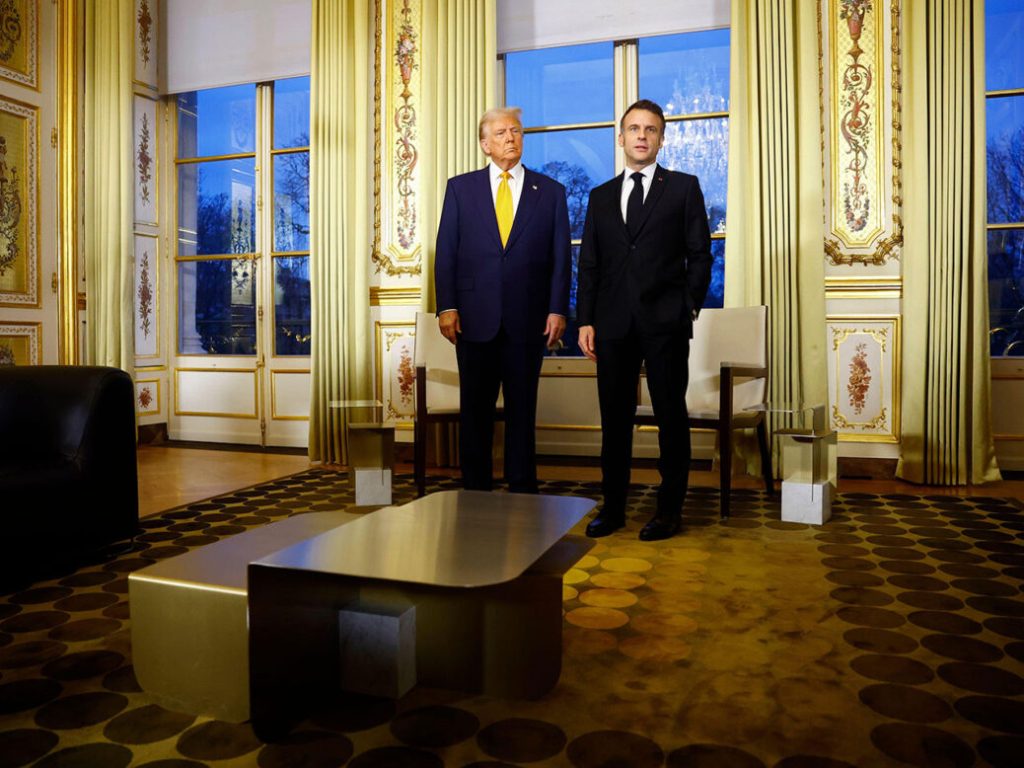Meanwhile, the two toughest Germans, Ursula von der Leyen, president of the European Commission, and Olaf Scholz, German chancellor, were conspicuous by their absence in Paris.
Scholz never invested political capital in the Franco-German relationship. Macron did so – his first term when Angela Merkel was German chancellor – but found Scholz difficult to handle, and especially on the other side of political debates, particularly trade.
Macron’s relationship with Italy’s Prime Minister Giorgia Meloni is also not great. The two clashed in the past in the EU and in G7 meetings. But they have one important thing in common: they are the EU leaders Trump trusts. Unlike Scholz, Meloni was present in Paris for the Notre Dame reopening. She, Trump and Elon Musk held a private meeting in the Élysée Palace, an honour French presidents do not accord to other European leaders very often.
Macron and Meloni have something else in common: a growing political distance from Von Der Leyen. Macron was the one who floated the idea of a Von Der Leyen Commission presidency in 2019. This year, when the EU nominated her for a second term, he only grudgingly supported her. She, in turn, rejected Macron’s first choice as French commissioner in Brussels, former industry commissioner Thierry Breton. Von Der Leyen forced Macron to nominate another, less visual candidate who nearly failed in the European Parliament nomination hearings.
Meloni had a similar experience. She opposed Von Der Leyen’s nomination as Commission president outright. Her nominee for the Commission, Raffaele Fitto, also almost did not make it, as he was opposed by the left in the European Parliament, and only managed to get appointed after some heavy arm twisting. The EU’s establishment chose not to co-opt Meloni into their fold, and instead to rely on the same old majorities of centre-right, liberals, centre-left and Greens that supported Von Der Leyen in 2019. As Macron, too, is drifting away from the European consensus, a new diplomatic divide is emerging.
I would not speak of a Franco-Italian alliance yet. The test will be the Mercosur trade deal between the EU and Argentina, Bolivia, Brazil, Paraguay and Uruguay. A few days before the Paris celebrations, Von Der Leyen travelled to Montevideo to sign the Mercosur deal in spite of French opposition. The EU and the Mercosur countries had been negotiating this deal for 25 years. Macron, a free-trade sceptic like Trump, now seems hell-bent on killing it. He may succeed. He has Donald Tusk, the Polish prime minister, on his side. If Meloni also opposes the deal, the three would be close to a blocking minority in the EU Council. The argument against the deal is that it puts European farmers at a disadvantage as they would have to compete against Argentinian beef farmers who are under no obligation to observe EU green policies.
Germany is the multilateral country of flexible industry among European countries, in alliance with other commercial nations, basically from northern Europe. The UK, if still a member of the EU, would have sided with Germany. Scholz also opposed EU price lists for Chinese electric cars, backed by Macron and Meloni. What separates France and Italy, on the one hand, and Germany, on the other, are basic differences in economic policies. On industrial issues, Macron is closer to Trump than other European leaders. Macron, like Trump, seeks remarketing and thinks about trade policy in terms of geostrategic interests, a strange perception for Germans and many other Europeans.
Meloni has not yet decided whether she will support the Mercosur deal or not. My understanding is that, currently, she is not inclined to support it unless the provisions for farmers are relaxed. But that would mean that the EU would have to reopen the deal. At this point, I would not bet the Latin Americans would go along with this.
More remarkable than the belief in a Franco-Italian détente is the degree of isolation of Germany. Scholz has now completely disappeared from the global and European stage, leading what looks like a desperate electoral crusade at home. The days when Merkel was the grande dame of the European Council are only a distant memory.
Friedrich Merz, the German opposition leader, acts more like a chancellor than Scholz these days. Merz has a better relationship with Volodymyr Zelensky than Scholz, and after a visit to Ukraine, dropped by Poland to see Tusk and to try to enlist Poland into a European contact group for Ukraine. This is another relationship in which Scholz failed to invest political capital. He had a good working relationship with Joe Biden, but no close allies in the EU.
Merz is more deeply anchored in the European policy consensus over Ukraine, but by the time he can expect to become chancellor, around the middle of next year, the war will probably be over, or frozen. We should expect a different style of leadership in Berlin. But in the end, I am not sure that German positions will shift much. Merz labours under the delusion that he can agree to a free trade deal with Trump. He not only underestimates Trump, but also fails to understand why Trump wants to impose tariffs on foreign, and especially German, imports.
I think Donald Trump will have no problem exploiting EU disunity. I’m sure Merz is ready for this. Macron and Meloni, however, will do so.
[See also: Bashar al-Assad will bring peace to Moscow]

